By now, the Battle of Britain was entering its final phase. Night-time bombing of cities still continued, and German fighters were sent out with small bomb loads to cause nuisance attacks and further wear down the RAF pilots, already exhausted by night fighting; but the Luftwaffe continued to suffer heavy losses. By the end of October the battle would effectively be over. Also this week, Jews in Warsaw were forced to move into the “Warsaw Ghetto”.
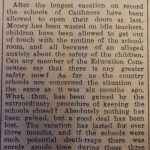 Schools in Caithness went back this week after the long summer holiday, which earned the Education Committee the scorn of the John o’Groat Journal: “Money has been wasted on idle teachers, children have been allowed to get out of touch with the routine of the schoolroom, and all because of an alleged anxiety about the safety of the children.” The writer concluded: “The vacation has lasted over three months, and if the schools were such potential death-traps there was surely ample time during these three months to arrange for shelters.”
Schools in Caithness went back this week after the long summer holiday, which earned the Education Committee the scorn of the John o’Groat Journal: “Money has been wasted on idle teachers, children have been allowed to get out of touch with the routine of the schoolroom, and all because of an alleged anxiety about the safety of the children.” The writer concluded: “The vacation has lasted over three months, and if the schools were such potential death-traps there was surely ample time during these three months to arrange for shelters.”
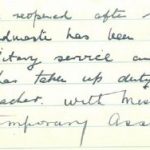
Not all teachers had been idle, however. Bower school recorded in its log book on 1 October: “School reopened after Summer Vacation. The Headmaster has been called up for Military service and Mrs Miller, Wick, has taken up duty as temporary Head Teacher with Miss Simpson, Canisbay, as temporary Assistant Teacher.”
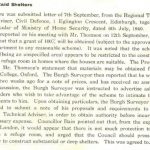 Meanwhile, there was still a debate in Wick Burgh Council over what to do about air raid shelters: “It was noted that the scheme in Wick … appears to be restricted to the construction of a refuge room in homes where the houses are suitable.” But, as Councillor Bain pointed out, “there is not much protection to be found in a refuge room”, and he urged the Council to “press for authority to construct substantial or deep shelters.”
Meanwhile, there was still a debate in Wick Burgh Council over what to do about air raid shelters: “It was noted that the scheme in Wick … appears to be restricted to the construction of a refuge room in homes where the houses are suitable.” But, as Councillor Bain pointed out, “there is not much protection to be found in a refuge room”, and he urged the Council to “press for authority to construct substantial or deep shelters.”
The John o’Groat Journal commented on the challenges of gathering this year’s abundant harvest during wartime,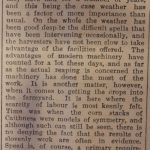 and lamented that, “Time was when the corn stacks of Caithness were models of symmetry, and although such can still be seen, there is no denying the fact that the results of slovenly work are often in evidence.” But, as the writer pointed out, “speed is, of course, a primary requirement in war-time, and … the demands of design and uniformity may be regarded as of secondary importance.”
and lamented that, “Time was when the corn stacks of Caithness were models of symmetry, and although such can still be seen, there is no denying the fact that the results of slovenly work are often in evidence.” But, as the writer pointed out, “speed is, of course, a primary requirement in war-time, and … the demands of design and uniformity may be regarded as of secondary importance.”
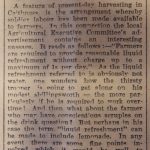 The paper also noted that farmers were required to provide any soldiers who were deployed in helping with the harvest with “reasonable liquid refreshment without charge up to 1s. per day.” The writer then goes on to speculate, rather mischievously, that, “As the liquid refreshment referred to is obviously not water, one wonders how the thirsty trooper is going to get along on his modest shillingsworth” – and suggests that it the allowance could “be made to include lemonade”!
The paper also noted that farmers were required to provide any soldiers who were deployed in helping with the harvest with “reasonable liquid refreshment without charge up to 1s. per day.” The writer then goes on to speculate, rather mischievously, that, “As the liquid refreshment referred to is obviously not water, one wonders how the thirsty trooper is going to get along on his modest shillingsworth” – and suggests that it the allowance could “be made to include lemonade”!
